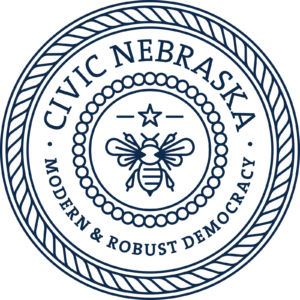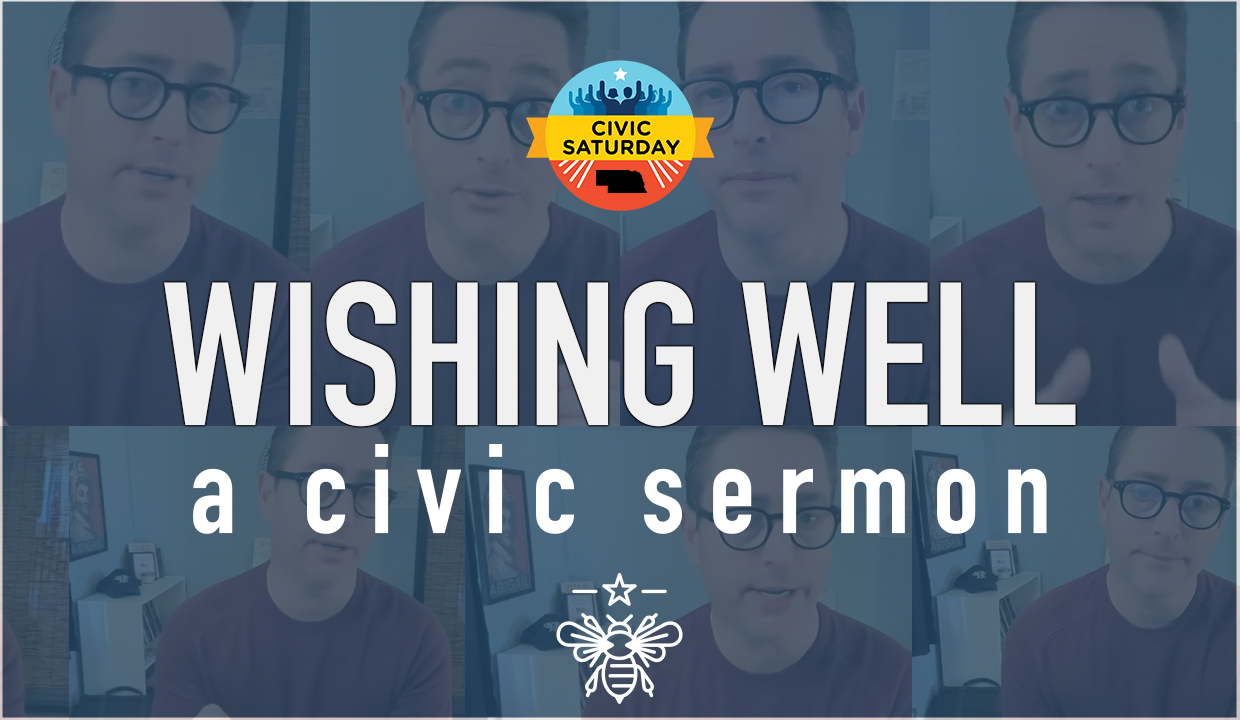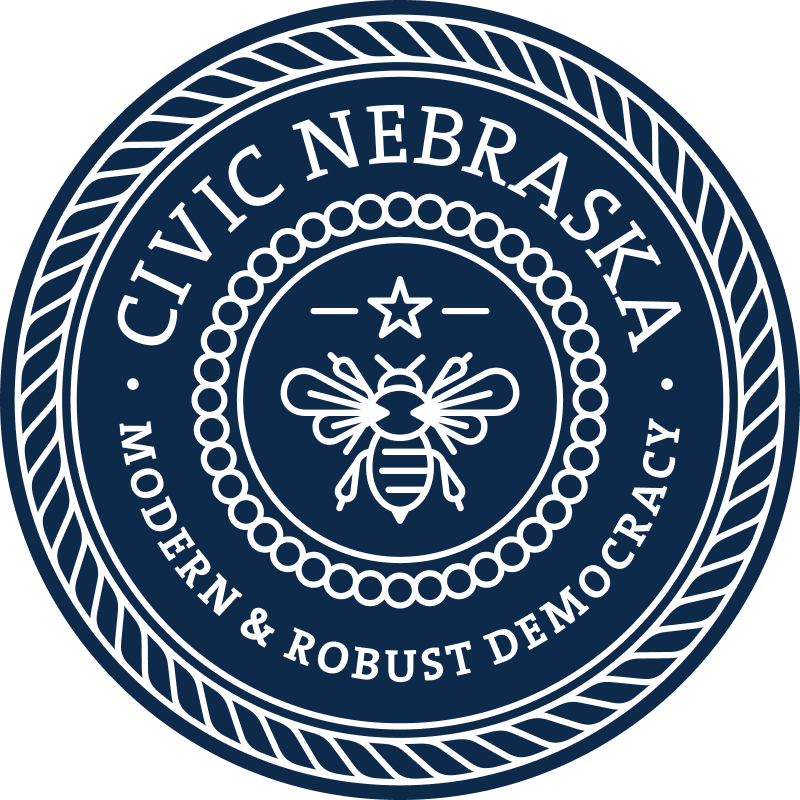On Jan. 22, 2022, Civic Nebraska held its eighth Civic Saturday, during which National Citizen University / Civic Saturday Fellow Steve Smith delivered the following “civic sermon.” To watch the entire gathering from Jan. 22, click here.

How do you know if you’re a glutton for punishment? Asking for a friend.
The evidence against me is mounting. I still watch every Husker men’s basketball game. And I’ve just purchased another 500-plus-page book to read, just as soon as I finish the 500-plus-page book I’m currently trying to grind through. And also? I have a Google News Alert that is set for the word “democracy.”
 It usually arrives each morning at about 10 with the latest dispatches from our war of ideas. Sometimes, the headlines are enough to make me want to cry. Here are a few recent ones that graced my inbox.
It usually arrives each morning at about 10 with the latest dispatches from our war of ideas. Sometimes, the headlines are enough to make me want to cry. Here are a few recent ones that graced my inbox.
Democracy is on life support
Nearly 60 percent of Americans worry democracy is collapsing
The war to save democracy could kill democracy
Mm, I kinda want to read that one.
Here’s the headline that scared the hell out of me, though. Really put the fear of God in me.
How last January 6 put the existence of the U.S. in question
That was on an essay by Timothy Snyder. He’s a historian and author who has written extensively about how tyranny can find multiple ways to overwhelm formerly free countries. I usually pay attention to what Tim Snyder says, because fortunately or unfortunately, he’s been right about a lot of things in recent years.
I’m not going to read you his entire column, but basically, Snyder spells out a scenario that unfolds over the next two and a half years and ends with the United States ceasing to exist.
The scenario goes like this:
This November, the House and/or the Senate fall into GOP hands. That means the end of voting-rights legislation and the start of congressional hearings designed to convince Americans that the 2020 presidential election was somehow rigged. This is nothing more than a daily spectacle, but the hearings do their job. They keep the specter of election fraud alive, all the way through the 2024 campaign.
In November of 2024, the Democratic candidate wins both the popular vote and the Electoral College. But several states that went “blue” are run by Republicans. So they launch investigations into supposed election fraud. Well, this takes time, and so those states don’t assign their electors in time. From this decreased pool of electoral votes, neither candidate gets to 270.
Those of you familiar with the Twelfth Amendment – or the fifth season of the TV show VEEP – know that the matter then gets thrown to the House of Representatives. And in this case, each state only gets one vote. Mathematically, this gives Republicans a hammerlock on the presidency. They install the losing candidate.
Then everything hits the fan: Millions take to the streets. Militias start shooting. Police and the military don’t know who to take orders from. Red State Democrats flee to Blue cities, other states, or other countries. Governors around the nation seek exit strategies from the Union. And that’s the ballgame.
Jesus, that sounds like a Hunger Games prequel.
Maybe it’s time to take that Google alert off my phone. But then what? My minute-by-minute mental health might improve, but these problems don’t just go away if we don’t think about them. That hasn’t worked so well with COVID. In fact, I’d argue that our habit of constant distraction and willful ignorance of difficult truths is a big reason why serious people like Tim Snyder are now talking about the end of America.
It also may seem like all of this has come out of the blue, but it hasn’t. We’re finding ourselves frogs in boiling water, swimming in a culture that has normalized fear – fear of aging, of losing, of being left behind, of dying. Our media mainstreams this fear, too, and not just with the scary headlines I shared earlier. In a well-intentioned effort to cover what’s going on, our media also remind us constantly that we’re living in a world of shadowy disinformation, a world where we don’t know what to believe anymore. It’s immeasurably stressful.
So yeah, when we get a Google alert suggesting that our country won’t even exist in a few short years, it doesn’t necessarily feel like science fiction – or fiction at all – to an awful lot of us.
Because we’ve felt this fear before. Like a virus, our emotions are contagious. Humans are social animals, and as social animals, we intuit one another’s feelings, individually and on a mass scale. We’ve all experienced this at one time or another. Our feelings are communicable. We can project our hopes and our fears outward, and we can absorb the hopes and fears of others. This can have seismic effects.
Now, this is not necessarily bad in and of itself. As I mentioned, hope can go viral, too. There are lots of examples in our history of hope leading to powerful change, from the Great Depression to the New Deal, from the Great Society to the Civil Rights movement, from I Have a Dream to Yes We Can. Hope can spread, too.
So here we are, at the start of yet another election year. Fear and hope are preparing to resume their eternal dance. And I guarantee this: Both of these fundamental emotions will be making campaign stops near us in 2022. So let’s talk about them.
First, let’s look at fear, and what it can do to us – as persons, and as a people. Then, let’s look at hope, and what it can do to us – as persons, as a people. And finally, let’s look at ourselves, and what we can do. As persons, and as a people.
All right. Let’s get the scary stuff out of the way first.
Fear.
 Fear paralyzes. It wraps around us when we least expect it, and it squeezes away our capacity for critical thought. Our capacity for reason. When our chests get heavy and our nervous systems light up, our thoughts get reduced to: I will do anything for this to go away.
Fear paralyzes. It wraps around us when we least expect it, and it squeezes away our capacity for critical thought. Our capacity for reason. When our chests get heavy and our nervous systems light up, our thoughts get reduced to: I will do anything for this to go away.
When fear spreads, so does the pressure to simplify for the sake of safety. We know this; ever since 9/11, there has been a lot to be gained by keeping us scared. When we’re afraid and uncertain, we’re much more likely to surrender to easy answers. To con men who offer up quick fixes to difficult and complex problems. They come out of the woodwork in fearful times.
If enough of us fall into this sinkhole, well, we can justify any number of sins, can’t we? We become a country where things once intolerable become tolerable. The unthinkable becomes entirely thinkable. Violence in our schools, in our places of worship, in our streets, and now, in our politics? All of it, born of fright.
In a world of perpetual fear, the definition of we is so very narrow.
This stops progress cold. Because fear’s most devastating power is not in scaring us, it’s in forcing us to conform. To stand pat when we witness injustice. To be afraid of speaking up and standing out. We’ve seen versions of this in other times and other places, with monstrous outcomes. Where left unchecked, fear breeded suspicion. Which breeded discrimination. Which breeded persecution, and worse. Cruel things. Violent things.
We tell ourselves that we Americans are different from the Germans or Soviets or Rwandans or Serbs. But we are all human. And human beings, as Carl Sagan once said, “have demonstrated a talent for self-deception when their emotions are stirred.” A society built on fear and run on injustice comes for all of us at some point. History tells us so. We’ve all heard the poem from the pastor in Nineteen Forties Germany, the one that starts – “First they came for the socialists, and I did not speak out.” You know the rest.
Am I being overdramatic? Maybe.
Is what I suggest unthinkable? Absolutely not.
So let’s stop here for a moment and rid ourselves of the conceit that fear couldn’t lead us down a very dark road in America. Let’s take a moment and be frightened. To contemplate the end of the United States, or a modern version of what happened in Germany, Soviet Russia, Rwanda, Serbia. Right here, in America. In Nebraska. In Lincoln. Omaha. McCook. Norfolk. Scottsbluff.
Let’s ask ourselves, if we can, what we would do if we suddenly realized we were the frog in the boiling water.
Is that enough peering into the abyss? I think so.
Let’s turn toward the light. Let’s talk about hope.
 Who doesn’t like to talk about hope? It’s warm and fuzzy. Or … is it? I’d argue that being “hopey-changey,” as Gov. Palin once put it, is hardly the dreamy sort of state she thinks it is. In reality, hope is tough. It’s hard-nosed. Because, first and foremost, it’s intentional. It is a choice born of our force of will, and so it has an inherent inner strength to it. Let’s put it this way: We may find ourselves afraid – but you have to choose to be hopeful.
Who doesn’t like to talk about hope? It’s warm and fuzzy. Or … is it? I’d argue that being “hopey-changey,” as Gov. Palin once put it, is hardly the dreamy sort of state she thinks it is. In reality, hope is tough. It’s hard-nosed. Because, first and foremost, it’s intentional. It is a choice born of our force of will, and so it has an inherent inner strength to it. Let’s put it this way: We may find ourselves afraid – but you have to choose to be hopeful.
Best of all, hope builds courage, confidence, and optimism – the idea that our darkest hour can and will become our finest hour. Hope is in America’s DNA. For centuries, it’s been at the center of our nation’s spiritual growth and progress. That progress wasn’t random, it was intentional. Because hope makes people think, and imagine, and create. Done right, hope leads to the clarity that is required to make progress.
It’s more than just this vague sliver of light among dark clouds. Hope is a diagram for change, and an enduring promise of something new – the possibility of something better.
That’s as American as it gets.
Our country is facing a momentous test of American resolve. This test isn’t new: Generations before us, in times of war and economic strife and civil unrest, also asked: Should this go on, this thing of ours? Or will we allow the fear-mongers and the entrenched interests to extinguish this last, best hope? Can we push past our fears and take up the work to remake America, again?
Can we, as a people, still make this nation what it was meant to be?
I say we can, and we will.
So come with me, and let’s finish up today by building a different scenario.
 I suppose it would be easy for me to simply tell everyone we should hope more and fear less. There’s only one problem with that calculus: Hope doesn’t drive out fear. Action does.
I suppose it would be easy for me to simply tell everyone we should hope more and fear less. There’s only one problem with that calculus: Hope doesn’t drive out fear. Action does.
Remember, those who want to keep us afraid would rather we remain bystanders. Viewers. Consumers. They don’t want us to be active, powerful citizens. If we’re frozen by our fear, we’ll be unable to do anything but watch as they strip down the country for parts.
Hope does not drive out fear. Action does. Thoughtful, creative, persistent action. So first of all, we’ve gotta be ready, willing, and able to act. We have to ask ourselves, really ask ourselves: What am I prepared to do? Not just for myself, when trouble arrives at my door, but at the door of someone I don’t even know. What am I prepared to do? – even if it puts my reputation, my career, or my very safety at risk?
Some of you may wonder if you possess the moral courage to stand in this breach. I assure you – you do. If you dare to hope, then you possess this courage, and you will empower others to join you. Because, once again, emotions are contagious. If we are brave and clear with our intent, others can – and will – find the courage and clarity to act.
Civic Saturday isn’t supposed to be super-prescriptive; it’s best to provide food for thought, and then ask you to put that thought into action how you see fit. But perhaps, at this extraordinary time, it might be worth offering at least a few guideposts. Please indulge me a bit further.
First, act locally. Democracy begins at home. Technology is so powerful today that it has practically destroyed geography. Our politics have become so nationalized that we know more about what Joe Manchin and Kyrsten Sinema have been up to in the past week than our own elected leaders. Choose local engagement first, national obsession second. Choose community relationships and initiatives first, and hyper-polarized Beltway conflicts second. In other words: Let’s match our action with what is in our direct control. Democracy works best from the ground up, and can ripple like a sonic boom: In the Seventeen Seventies, town meetings in New England didn’t change the world, but they helped shape the American Revolution. And that Revolution eventually changed the world. So act locally.
Next, act on behalf of the truth. A year ago, we talked at length about how citizens in a democratic republic must be partisans for truth. This sounds obvious, but it bears repeating. Since then, the war on our shared reality has only intensified. We can either accept public lying or else we must summon the courage to confront it. There is no third way.
Reality is fracturing. Our trustless and tribal media environments are warping our daily perceptions until facts are practically unrecognizable. What is different from a year ago is that now, so much of the gaslighting comes from people with blue checks behind their names. That’s why I don’t get rid of my Google Alerts – or delete Twitter from my phone. Because I see it as my democratic duty to join the collective effort to hold these lies up to the light. If you can, I encourage you to do so, too.
Finally, we have to act as though our institutions are deeply vulnerable. Because they are – as designed. Our systems were built of the people, by the people, and for the people. And so, they’re only as strong as the people … the people who make them up, and those who defend them. Let’s lift up and amplify and engage with the kind of people who defend democracy, not those who would steal it away from us.
What’s the alternative? To go silent, and watch as we become a nation paralyzed by never-ending fear? A country of weaponized differences? Of politics saturated with threats of scarcity? Of cruelty? Of punishment for nonconformity? That’s a nation that is certain to fail – no matter what may happen in the next two and a half years.
We can’t have it. We tend to forget this when we’re afraid, but America has never been a passive exercise. The moments of big progress in our country – safe labor, women’s suffrage, voting rights, health care – didn’t manifest automatically in the halls of power. They came from the bottom up. Old hands joined with young ones to organize and mobilize in the clear-eyed, focused hope of making change.
They didn’t just drop a penny in the wishing well and expect magic to happen. They persisted. They reached out to others, and with others. They took the wider view, got creative, and lifted each other up. And, as a result, they got us closer, ever closer, to that more perfect union.
That’s America, wishing well. Hope from action, and action from hope. That’s the only sort of citizenship that’s worth doing. And from where I sit, it’s the only sort that we should want to go on doing.
So. Here’s hoping.


